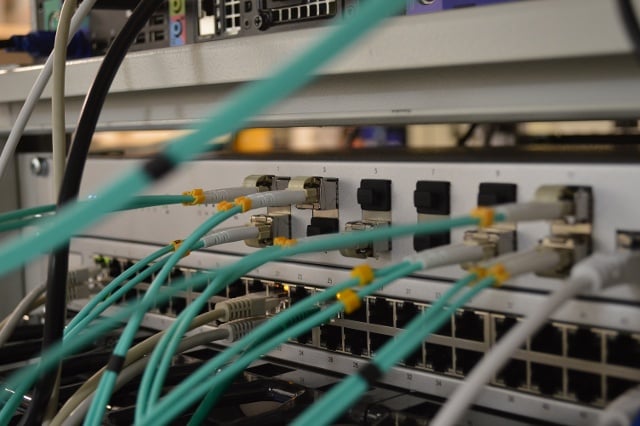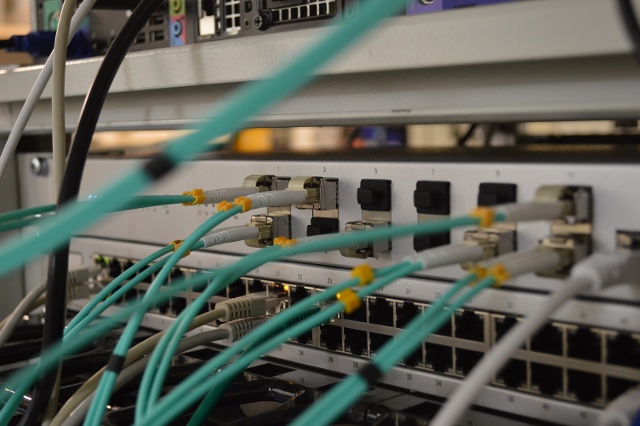

Cisco Systems dominates the IT networking industry. Nearly 50% of the world’s Ethernet configurations run on Cisco equipment, which means, if you are interested in pursuing a career that involves computer networking and communication, at some point, you are likely to have to handle Cisco Systems. For this reason, the entry-level Cisco CCNA certification is an important one to have under your belt.
That is all well and good, but how hard is CCNA to pass?
What is CCNA?
The Cisco Certified Network Associate (CCNA) certification is generally considered Cisco’s entry-level accreditation for anyone looking to prove they understand the fundamentals of building and managing digital networks. Not surprisingly, the CCNA exam focuses on Cisco technology, unlike the similar Network+ certification from CompTIA, which is vendor-neutral.
Although we often refer to CCNA being an entry-level certification, it is probably better to look at it as an early-career level certification. Cisco has no formal prerequisites for CCNA, but they recommend that candidates have one or more years’ experience working with Cisco solutions, a basic knowledge of IP addressing, and a good grasp of networking fundamentals before taking the exam.
If you are a computer novice, you should consider taking CompTIA A+ and Network+ before CCNA. This will ensure that you have the computer and networking basics down before launching into the more demanding CCNA exam.
Why is CCNA Important in Maryland?
CCNA certification is essential to any IT professional who is going to be working with IT networks and communications. With Cisco commanding a close to 50% share of the Ethernet switch market (source statistica.com) and a 39% share of the WLAN market, the chances are you will be handling Cisco equipment at some point in your career.
CCNA covers a lot of ground. To pass the exam, you must have accumulated a broad portfolio of networking knowledge and skills. Gaining CCNA certification proves to recruiters that you have attained a solid understanding of networking.
As a well-established player in the information technology industry, the Cisco name carries a lot of weight. In addition, gaining Cisco-specific skills with CCNA certification makes your resume much more attractive to recruiters.
Considering the vast number of large government and military organizations present in the Washington DC region, including in Maryland and Virginia, skilled Cisco technicians are much in demand. So, if you work in the District or nearby, CCNA would be a great certification to build your IT career on.
What is the CCNA Exam Like?
In 2020 Cisco made significant changes to the CCNA exam. Rather than having multiple exams, each covering a networking discipline, Cisco brought all the core elements together in a single exam. The result is that with one exam, you can prove that you have a sound understanding of a wide range of topics covering IT networking fundamentals.
The new CCNA 200-301 exam lasts for 120 minutes and covers a wide range of topics. You will be tested on your understanding of IP connectivity, network fundamentals, IP services, network access, security fundamentals, automation, and programmability.
On passing the exam, you have three years until you need to recertify.
But How Hard is the CCNA Exam?
Reviewing the CCNA curriculum and comments from students who have taken the exam, the overall opinion is that the CCNA exam is relatively straightforward from a technical concept point of view. Still, the sheer volume of knowledge you must assimilate to cover all the topics can be challenging.
How Hard is the CCNA Exam from a Technical Point of View?
The consensus from students who have taken the exam is that the questions are technically straightforward and fair if you have the recommended previous experience. Most candidates cited the benefit of taking CompTIA Network+ as a primer for the additional material they needed to learn for the CCNA exam. Students who jumped straight into CCNA found the networking concepts and skills harder to grasp.
From a technical perspective, I have seen a few comments regarding the additional emphasis on automation and programmability in the new CCNA exam. There is a concerted effort to automate as much of the network configuration and management as possible with all modern digital systems. If you lack coding experience, you may need to pay particular attention to these areas as you prepare for the exam.
Another big differentiator between candidates that found the CCNA exam easier and those that didn’t was the opportunity to prepare for the exam using actual Cisco equipment. Those students who tried both simulation software and live hardware noted a considerable difference in their ability to handle and configure the different systems. So, you can boost your chances of passing the exam if you choose a training program that offers hands-on practice with live Cisco equipment.
How Hard is the CCNA Exam to Prepare For?
According to students who have taken CCNA, the most challenging part was learning and retaining all the knowledge and skills required for the exam.
When Cisco introduced the new exam in 2020, they consolidated the material that had previously been split between two exams into one. So, rather than focusing on one exam at a time with a narrower workload, you now must cover all the fundamentals in one go (on the plus side, you only have one exam to prepare for).
Keep in mind that this is a Cisco-specific certification. So besides learning all the basic networking knowledge and skills, as you would do with Network+, you will also need to learn Cisco-specific terminology and functionality.
Students commented on the need to be prepared to devote a lot of time to study all the materials. Therefore, you should take this into account when planning your training and scheduling your certification exam.
All this may make CCNA certification seem a daunting prospect. Still, the overwhelming opinion is that if you meet the experience requirements that Cisco recommends and commit the time, you can assimilate the materials to pass the CCNA exam.
Is CCNA Worth It?
So, having established that, mainly due to the volume of material you have to learn, the CCNA exam can be challenging for students. Is it worth investing time and money on CCNA certification?
If you are looking to build an IT career that encompasses digital networking devices, our answer would have to be yes. Having CCNA certification proves that you understand the fundamentals of operating a digital network within a corporate environment. In addition, the Cisco name carries weight with recruiters looking for qualified job candidates.
According to ZipRecruiter, The average annual pay for an entry-level CCNA position is $43,108 in Washington, DC, a little less than the national average of $46,740. And entry-level CCNA positions in Baltimore average $51,968. So, even if you invest a couple of thousand dollars in instructor-led classes, the ROI is pretty good.
In addition, getting your CCNA certification sets you up to progress to CCNP and other more advanced Cisco certifications, enabling you to take on advanced IT roles earning lucrative salaries.
What Should I Do Next?
If you are a computer novice looking to get established in the IT industry, your next best step is to get your CompTIA A+ training and certification. It would be best if you also considered taking CompTIA Network+ as recommended by many of the students who have taken CCNA. These two certifications establish your foundation in IT and prepare you for entry-level roles and next-level certifications like CCNA.
You should also find ways to gain experience, either taking a job in an IT department or volunteering at an organization where you can experience configuring, troubleshooting and help to maintain computer networks. After this, you should be ready to take on CCNA training and certification.
If you already have CompTIA A+ or equivalent experience and have spent a year or more working with networking technologies, you should look for a reputable training program. There are many ways to study for the CCNA, from self-guided courses to in-person, instructor-led ones. Your choice will depend on your personal learning style, your budget, and your available time.
Online, self-guided training is often cheaper and more flexible than other types of programming, but they are likely to take much longer, and it is harder to ensure that you are covering everything you need to know. Instructor-led classes are more expensive but give you a much more structured approach to learning. This ensures you cover everything you need to in a much shorter time frame.
Instructor-led classes also provide much more backup if you have trouble understanding concepts.
TrainACE offers instructor-led CCNA training at different times during the week to suit your schedule. Taught by experienced instructors, these classes offer hands-on training with actual Cisco equipment – a significant advantage highlighted by many students who have taken the CCNA exam.
Leave Your Comment Here